#devops consultant
Explore tagged Tumblr posts
Text
Why Hire a DevOps Consultant? This blog explains the key advantages of hiring a DevOps consultant, including expertise in streamlining development workflows, enhancing collaboration between teams, and improving software delivery processes. It emphasizes how consultants help organizations adopt best practices in automation, continuous integration, and cloud infrastructure management, resulting in faster deployments and increased efficiency.
0 notes
Text
Streamline Your Operations with a DevOps Service Provider
Streamlining your operations is at the core of what a DevOps Service Provider does best. This description explores how DevOps Service Providers can be the catalyst for operational efficiency. By leveraging their expertise and services, you can automate processes, accelerate deployment, and enhance collaboration within your organization. With DevOps Service Providers by your side, you can achieve a leaner and more agile operation, gaining a competitive edge in today's tech-driven landscape.
0 notes
Text
What is DevOps? Simple Steps You Can Follow for Seamless Transition to it.

Enterprises can achieve certain levels of success by identifying the need in the market, hiring skilled resources, and utilizing advanced tools and technologies. Every one of us is doing the same to keep moving in this competitive world.
But do you feel it helps you set apart and chart a long-term success for your business? The answer is a big NO! To achieve long-term success, you must address the values, beliefs, and behaviours to enable a “carefully crafted” work culture. It is something that helps an enterprise to transform its idea into a value. And when we talk about introducing such new practices and processes, DevOps plays a vital role. You must be wondering what DevOps is and how it is relevant. Let’s figure it out.
What is DevOps???
First thing, DevOps is not just a bunch of tools. Still, it is more about a cultural shift involving changes in how people are organized, and the processes facilitated by them are not governed simply by technology or tools. In another way, DevOps is a mix of cultural, development, and operational changes to better any enterprise or business. DevOps focuses on three different aspects like collaboration, communication, and seamless integration between technical and operations teams.
But why DevOps? Well, before we get into the nitty-gritty of how you can prepare your business for the DevOps transition, let’s take a look at the factors behind the rise of DevOps.
Management bottlenecks and IT Silos:
The approach is time-consuming and not helping enterprises get a satisfactory outcome for their investment.
Error-prone testing approach:
With fixed silos of the department, testing is not done in each stage of development, which results in post-release bugs and poor quality of the end product delivered.
Lack of transparency:
Isolated work stages cause a gap between expectations vs delivered products. The lack of transparency and collaboration makes the team rework and fails to address complaints from the end-users.
Delay in providing fixes:
Due to a lack of transparency between the technical and testing team, fixing bugs, making new changes, or implementing them takes longer than expected. This, in the end, results in a delay in time to market for the client or stakeholders.
Related Article: The Fusion of DevOps and Agile
Benefits of DevOps
We’ve seen what the different problems faced with traditional SDLC are. Let’s take a look at how DevOps benefits enterprises.
Enable faster deployment with frequent delivery of updates and bug fixes.
Get rid of stress to release new features or fixes with a stable work environment.
Helps you improve the overall product quality with effective collaboration between tech and testing teams.
Since back-end systems are updated in smaller chunks and testing and development cycles are streamlined, your website remains up and running. In the end, it reduces downtime.
Ease of automating repetitive tasks, which encourages innovation and fixes the bugs quickly.
Brings agility to your business.
Continuous delivery of a product since all the departments are equally responsible for delivering a quality solution.
Helps you reduce the overall cost of production since maintenance and new updates are all covered systematically.
How to transition to DevOps?
Shifting your organisation's culture is not possible overnight, but you can surely define actions and informed decisions to initiate it for sure. Adopting a DevOps culture is challenging, and no enterprise can implement it successfully without following the right steps. Let's take a look at how you can prepare for the transition to DevOps without any hassle.

Make sure everyone within your team is aligned. Since it is all about a cultural shift, everyone must be on the same page. You can start educating them about what DevOps is and why DevOps is important for your organization. Unless everyone is sure and confident about how it will benefit your organization, you cannot move ahead.
Figure out a budget. Another important factor you must consider to prepare for the DevOps transition is creating a rough estimate of the expenses you will have to deal with while transitioning to DevOps. Not having a proper budget plan will waste money and reduce productivity.
Foster communication and collaboration. Communication and collaboration are two main aspects of DevOps. It would be best if you kept in mind that DevOps is not limited to development and operations. It is more about bringing all stakeholders together to work on common goals and objectives. You should start adopting agile practices and let everyone in the team know about their role. They should have an overview of where the project is moving and steps to help them be there.
Employ discipline and accountability. It is a must that you enforce discipline and accountability where everyone is responsible for their work. You can follow things like spike programming, unit tests, commented code, etc. Since developers and DevOps engineers work through the entire application lifecycle, they must develop diverse skills that are not limited to any specific role.
Train your team. DevOps is all about developing a new skill set, and thus, you must start investing in training your team as a long-term investment since it will help you change your development approach. It will help you achieve faster completion of the project in the future.
Start using the right set of tools. Of course, DevOps is all about mindset and cultural shift, but tools are also integral. Your transition works effectively when your team is well-aware of various tools like Git, Docker, Hadoop, Kubernetes, etc. However, it is important to keep in mind that whatever tools you use are compatible to enhance the work environment.
Don’t overlook version control systems. It would help if you always considered the scenario where you have to roll back certain changes or access archived code in the event where you need to re-use previously written code snipped. Using version control systems and shared repositories could ease your work.
Once you’re ready with all the necessary preparations, you can start the transition journey to DevOps.
How can We help?
When you implement DevOps, you can achieve significant improvements in speed of delivery, cost, and security. However, this is true when you have implemented it correctly. We know how difficult it is to shift to DevOps and our DevOps experts know who to make it smoother for you. Get in touch with our DevOps engineers now…
Source: What is DevOps? Simple Steps You Can Follow for Seamless Transition to it
#devops consultant#devops solutions#devops development services#devops services company#devops consulting companies#devops consulting services
0 notes
Text

Are you falling behind in your e-commerce game? commercetools can be your savior.
Our commercetools development services can fulfill your e-commerce needs, including:
High customization: Customize your store as per your brand image
Best-of-breed features: Take the most out of the best tools to provide a smooth shopping experience
Less risk: We help you overcome common errors
Faster TTM: Get your store up and running quicker
Let’s connect and give your e-commerce store the experience you want
https://www.altdigital.tech/about-us/contact-us
#commercetools #commercetoolsdevelopment #commercetoolsservices #commercetoolsdevelopmentservices #ecommerce #ecommerceservices
#it service provider#software devops service#digital strategy consultant#devops service#web development#software#commerce tools#digital transformation consultant#digital customer experience services
2 notes
·
View notes
Text
Uncover the power of AWS with our carousel of key findings! Dive into essential AWS statistics and unlock insights you didn't know you needed.



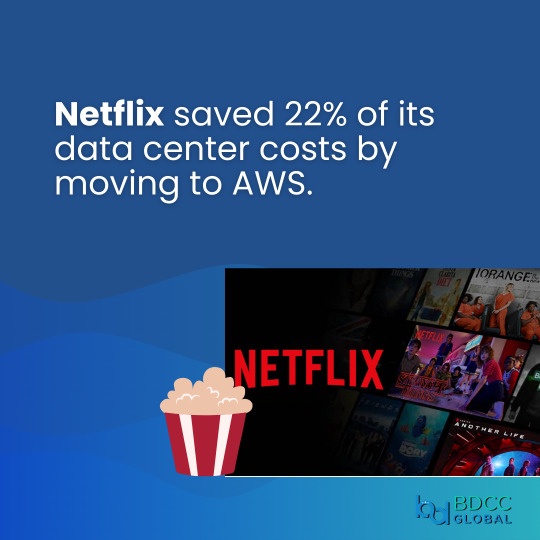
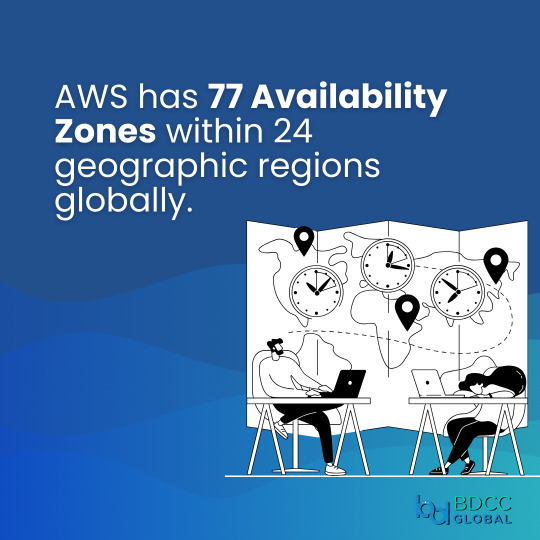
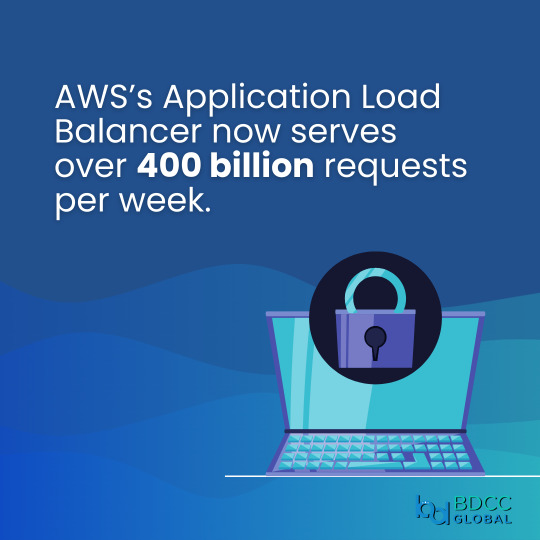
4 notes
·
View notes
Text
SPARK TECHNOLOGIES
We deliver value by identifying opportunities that align with business objectives and adopting an agile approach to implement them.
#Web developement#Software testing#Devops & Engineering#Salesforce#Mobile Application Developmen#Data Analytics#IT Consulting#IT Outsourcing#Web Design#Content Management System#Digital Marketing
2 notes
·
View notes
Text
SPARK TECHNOLOGIES

We deliver value by identifying opportunities that align with business objectives and adopting an agile approach to implement them. We take full accountability for the IT and operation initiatives we propose and help you accomplish business goals faster. click here for more
#webdevelopement#softwaretesting#devops & engineering#salesforce#mobile application development#data analytics#it consulting#it outsourcing#web design#content management system#digital marketing
2 notes
·
View notes
Text
Top FAQs about Azure DevOps Consulting

The complexity of modern software development is overwhelming you, don't you think? Do you want to increase output and simplify your processes? Azure DevOps can assist! To help you understand how Azure DevOps consulting can help your business, this blog article answers the most common questions regarding it.
Here are the key factors: ➡️ You can create automated testing and deployment pipelines, train your teams on best practices, and set up and configure DevOps services with the assistance of Azure DevOps specialists.
➡️ Businesses encounter difficulties with integration, security issues, and cultural opposition to change. You can overcome these obstacles by using consulting services.
➡️ Security is a top priority, and to guarantee compliance, consultants integrate security principles into your development pipeline.
➡️ It uses several features to optimize CI/CD pipelines for scalability and performance, and integrates with other tools.
Azure DevOps consulting might be a great help if you're trying to start from scratch or improve your current DevOps procedures.
Are you prepared to find out more? For a more thorough discussion of these subjects, visit the blog post!
4 notes
·
View notes
Text
#DevOps lifecycle#components of devops lifecycle#different phases in devops lifecycle#best devops consulting in toronto#best devops consulting in canada#DevOps#kubernetes#docker#agile
2 notes
·
View notes
Text
Unveiling the Wonders of DevOps: Exploring Benefits and Challenges in Simple Language
Hello tech enthusiasts! If you've ever been curious about DevOps and desire a clear breakdown of its advantages and drawbacks, you're in for a treat. Let's dive into the marvels and obstacles of DevOps using plain and simple language from The Best Devops Training Institute in Bangalore.

The Upsides: Embracing the Magic of DevOps
1. Swift Software Delivery:
The Marvel: DevOps functions like a magician's wand, hastening the pace of software development and delivery. Updates and features roll out faster, ensuring you stay agile in the ever-evolving tech landscape. I will highly recommend the best Devops Course in Bangalore.
Why It's Fantastic: Quick updates keep you relevant and adaptable in a fast-paced digital world.
2. Team Collaboration Triumphs:
The Marvel: In the DevOps universe, developers and operations teams become dynamic partners. No more working in isolation; they team up to eliminate obstacles and ensure a seamless flow of creativity and technical expertise.
Why It's Fantastic: Team synergy fosters innovation, leading to more robust and inventive software.
3. Reduced Glitches, Enhanced Stability:
The Marvel: Similar to a flawless spell, DevOps minimizes software glitches. It's a time-saver, making your software more dependable.
Why It's Fantastic: Spending less time troubleshooting issues means more time for creating exceptional software.
4. Automation Magic:
The Marvel: Just like a magical incantation, mundane tasks can be automated with DevOps. This translates to less time devoted to routine chores and more time for imaginative and impactful work.
Why It's Fantastic: Automation liberates you from the shackles of repetitive tasks, unleashing your creative potential.
5. Continuous Feedback Loop:
The Marvel: DevOps comes with a built-in oracle, offering insights into how changes impact the software. This continuous learning loop facilitates ongoing improvements.
Why It's Fantastic: Learning from every step ensures a software evolution that continually enhances.
6. Innovation Boost:
The Marvel: DevOps doesn't just deliver software; it fosters a culture of continuous improvement and innovation. Your software stays ahead with the latest and most exciting features.
Why It's Fantastic: Embracing innovation keeps your software at the forefront of the industry.
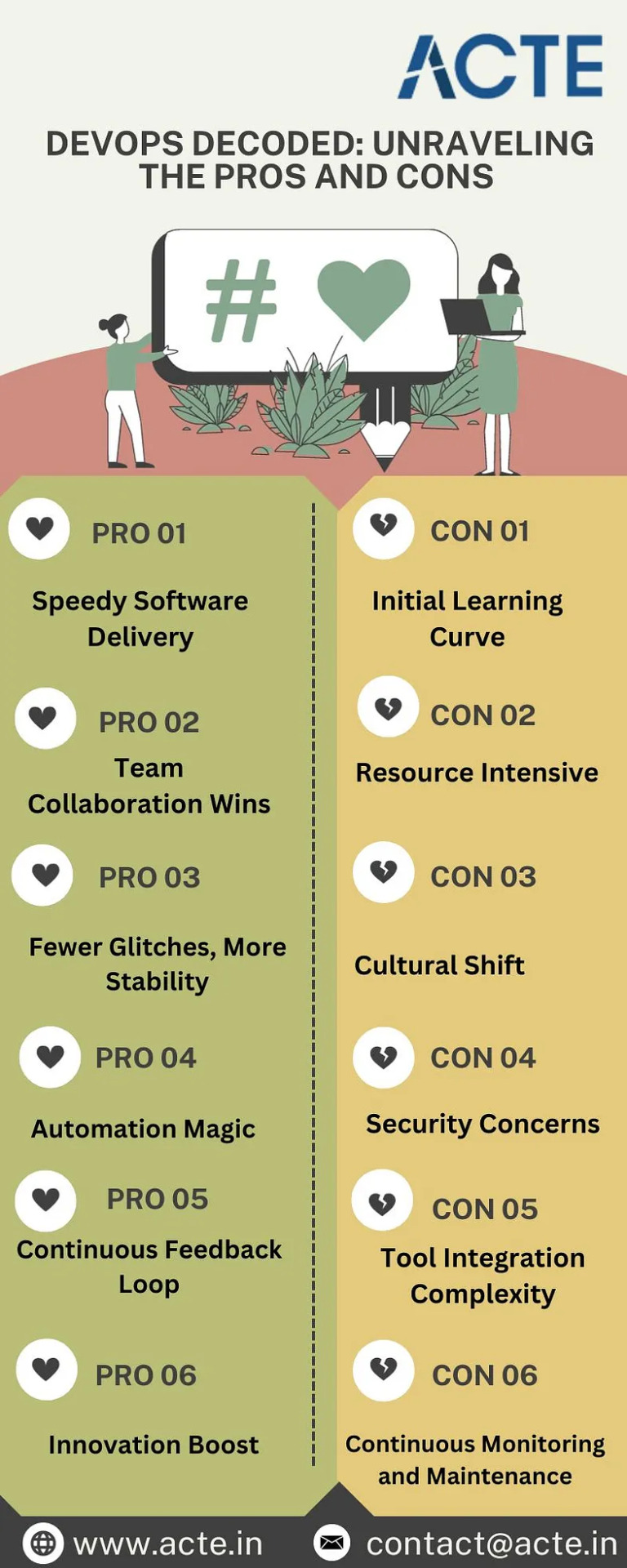
The Downsides: Navigating the Challenges of DevOps
1. Initial Learning Curve:
The Challenge: Implementing DevOps demands a shift in mindset and practices, leading to an initially steep learning curve.
Navigating It: Invest time in training and ensure everyone is on board to ease into the new DevOps culture.
2. Resource Intensive:
The Challenge: Adopting DevOps can require significant resources, from tools to skilled personnel.
Navigating It: Plan the transition carefully, allocate resources wisely, and consider gradual implementation.
3. Cultural Shift:
The Challenge: DevOps isn't just about tools; it's a cultural shift. Resistance to change can pose a stumbling block.
Navigating It: Communicate the benefits, involve the team in decision-making, and cultivate a collaborative culture.
4. Security Concerns:
The Challenge: The speed of DevOps can raise concerns about security lapses.
Navigating It: Integrate security measures into the DevOps pipeline and prioritize continuous security testing.
5. Tool Integration Complexity:
The Challenge: Integrating different tools in the DevOps toolchain can be complex.
Navigating It: Choose tools wisely, ensure compatibility, and provide training for seamless integration.
6. Continuous Monitoring and Maintenance:
The Challenge: DevOps requires continuous monitoring and maintenance, adding an ongoing responsibility.
Navigating It: Establish robust monitoring practices and allocate resources for ongoing maintenance.
Conclusion: Navigating the DevOps Journey
In the captivating realm of DevOps, the advantages are enchanting, offering speed, collaboration, and innovation. However, like any journey, challenges are present. The key lies in understanding and addressing these challenges, embracing the cultural shift, and crafting a DevOps strategy aligned with your team's goals. So, gear up, embrace the magic, and embark on a DevOps journey that transforms the way you create and deliver software!
2 notes
·
View notes
Text
DevOps Consulting Services | Goognu - Transforming Your Business with DevOps Solutions
Goognu offers top-notch DevOps consulting services to help businesses streamline their software development and operations. Our expert team provides comprehensive solutions for implementing DevOps practices, optimizing workflows, and automating processes. Boost your productivity, agility, and efficiency with our tailored DevOps strategies. Contact us today for a consultation and take your business to new heights with Goognu's industry-leading DevOps expertise.
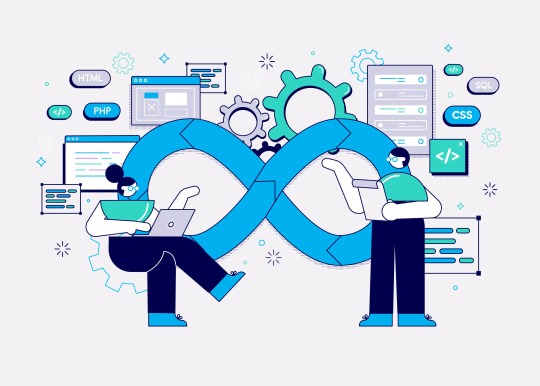
3 notes
·
View notes
Text
Streamlining Success: The Impact of DevOps Consulting on Businesses
In today’s competitive business landscape, the integration of DevOps practices has become paramount for companies striving to achieve operational excellence and deliver high-quality products and services efficiently. The evolution of DevOps, combining development and operations, has revolutionized the way businesses approach software development, deployment, and maintenance. Introduction to…
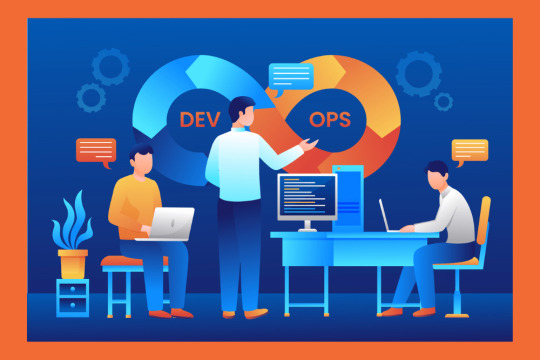
View On WordPress
#business growth#Business Innovation#Business Prosperity#Business Success#Business Transformation#Consulting Excellence#DevOps Consulting#DevOps Magic#Streamlining#Success Strategies#Transformative Consulting
2 notes
·
View notes
Text
The Internet of Things (IoT) is rapidly transforming our world, weaving a complex tapestry of interconnected devices that collect, share, and analyze data.
0 notes
Text
Why DevOps and Microservices Are a Perfect Match for Modern Software Delivery
In today’s time, businesses are using scalable and agile software development methods. Two of the most transformative technologies, DevOps and microservices, have achieved substantial momentum. Both of these have advantages, but their full potential is seen when used together. DevOps gives automation and cooperation, and microservices divide complex monolithic apps into manageable services. They form a powerful combination and allow faster releases, higher quality, and more scalable systems.
Here's why DevOps and microservices are ideal for modern software delivery:
1. Independent Deployments Align Perfectly with Continuous Delivery
One of the best features of microservices is that each service can be built, tested, and deployed separately. This decoupling allows businesses to release features or changes without building or testing the complete program. DevOps, which focuses on continuous integration and delivery (CI/CD), thrives in this environment. Individual microservices can be fitted into CI/CD pipelines to enable more frequent and dependable deployments. The result is faster innovation cycles and reduced risk, as smaller changes are easier to manage and roll back if needed.
2. Team Autonomy Enhances Ownership and Accountability
Microservices encourage small, cross-functional teams to take ownership of specialized services from start to finish. This is consistent with the DevOps principle of breaking down the division between development and operations. Teams that receive experienced DevOps consulting services are better equipped to handle the full lifecycle, from development and testing to deployment and monitoring, by implementing best practices and automation tools.
3. Scalability Is Easier to Manage with Automation
Scaling a monolithic application often entails scaling the entire thing, even if only a portion is under demand. Microservices address this by enabling each service to scale independently based on demand. DevOps approaches like infrastructure-as-code (IaC), containerization, and orchestration technologies like Kubernetes make scaling strategies easier to automate. Whether scaling up a payment module during the holiday season or shutting down less-used services overnight, DevOps automation complements microservices by ensuring systems scale efficiently and cost-effectively.
4. Fault Isolation and Faster Recovery with Monitoring
DevOps encourages proactive monitoring, alerting, and issue response, which are critical to the success of distributed microservices systems. Because microservices isolate failures inside specific components, they limit the potential impact of a crash or performance issue. DevOps tools monitor service health, collect logs, and evaluate performance data. This visibility allows for faster detection and resolution of issues, resulting in less downtime and a better user experience.
5. Shorter Development Cycles with Parallel Workflows
Microservices allow teams to work on multiple components in parallel without waiting for each other. Microservices development services help enterprises in structuring their applications to support loosely connected services. When combined with DevOps, which promotes CI/CD automation and streamlined approvals, teams can implement code changes more quickly and frequently. Parallelism greatly reduces development cycles and enhances response to market demands.
6. Better Fit for Cloud-Native and Containerized Environments
Modern software delivery is becoming more cloud-native, and both microservices and DevOps support this trend. Microservices are deployed in containers, which are lightweight, portable, and isolated. DevOps tools are used to automate processes for deployment, scaling, and upgrades. This compatibility guarantees smooth delivery pipelines, consistent environments from development to production, and seamless rollback capabilities when required.
7. Streamlined Testing and Quality Assurance
Microservices allow for more modular testing. Each service may be unit-tested, integration-tested, and load-tested separately, increasing test accuracy and speed. DevOps incorporates test automation into the CI/CD pipeline, guaranteeing that every code push is validated without manual intervention. This collaboration results in greater software quality, faster problem identification, and reduced stress during deployments, especially in large, dynamic systems.
8. Security and Compliance Become More Manageable
Security can be implemented more accurately in a microservices architecture since services are isolated and can be managed by service-level access controls. DevOps incorporates DevSecOps, which involves integrating security checks into the CI/CD pipeline. This means security scans, compliance checks, and vulnerability assessments are performed early and frequently. Microservices and DevOps work together to help enterprises adopt a shift-left security approach. They make securing systems easier while not slowing development.
9. Continuous Improvement with Feedback Loops
DevOps and microservices work best with feedback. DevOps stresses real-time monitoring and feedback loops to continuously improve systems. Microservices make it easy to assess the performance of individual services, find inefficiencies, and improve them. When these feedback loops are integrated into the CI/CD process, teams can act quickly on insights, improving performance, reliability, and user satisfaction.
Conclusion
DevOps and microservices are not only compatible but also complementary forces that drive the next generation of software delivery. While microservices simplify complexity, DevOps guarantees that those units are efficiently produced, tested, deployed, and monitored. The combination enables teams to develop high-quality software at scale, quickly and confidently. Adopting DevOps and microservices is helpful and necessary for enterprises seeking to remain competitive and agile in a rapidly changing market.
#devops#microservices#software#services#solutions#business#microservices development#devops services#devops consulting services
0 notes
Text
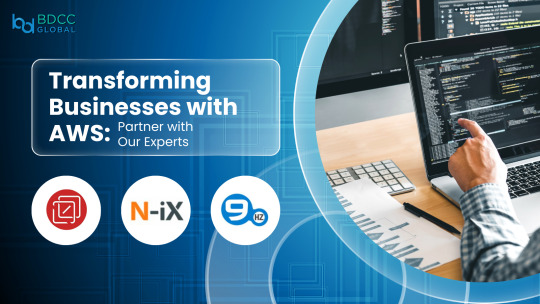
Elevate your business with AWS: Join forces with our expert team and unlock unprecedented growth and innovation. Let's transform together! https://www.bdccglobal.com/top-aws-consultants/
2 notes
·
View notes